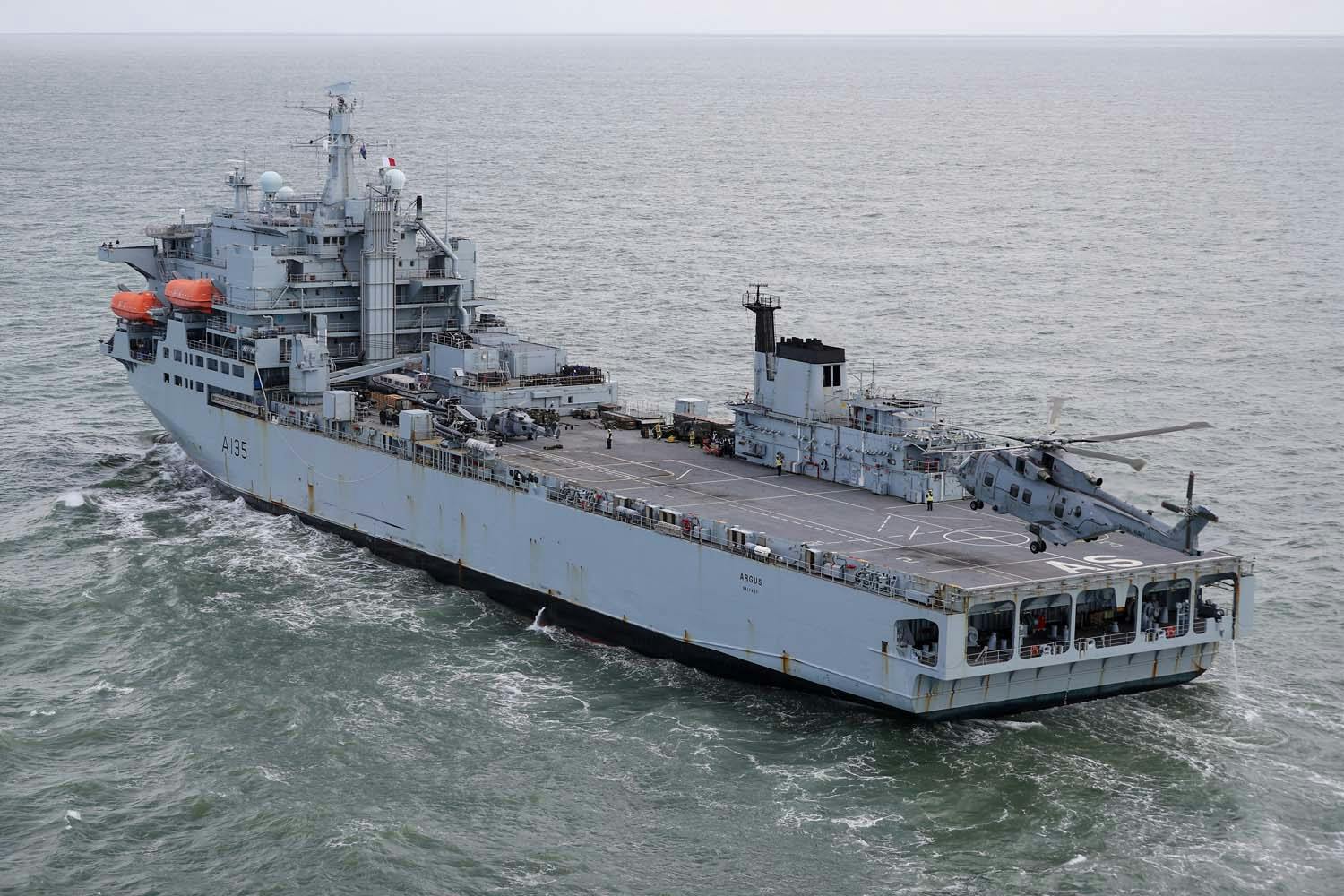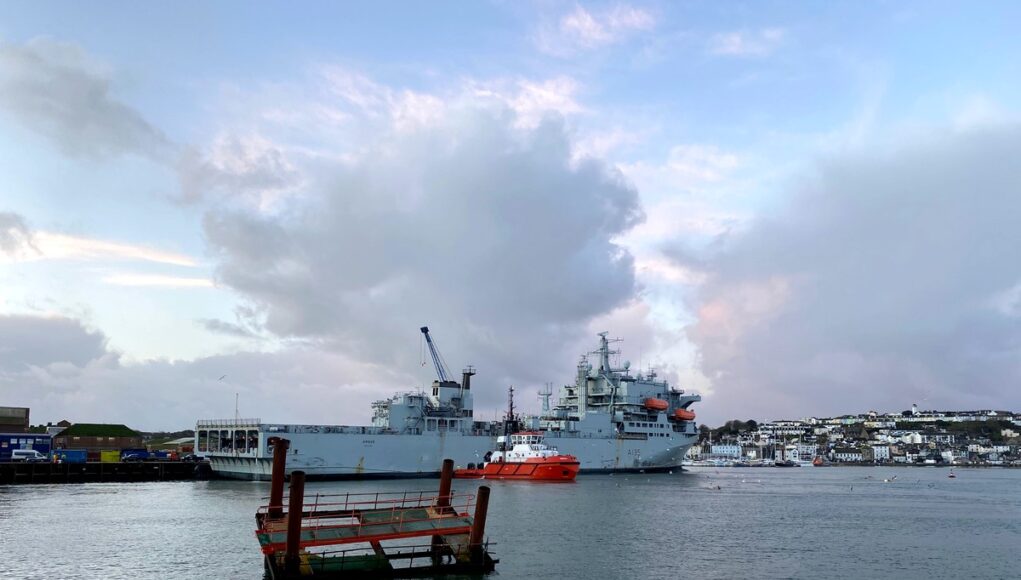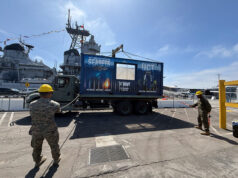RFA Argus arrived back to Falmouth at the weekend, after helping to stop more than £400m of drugs reaching Britain’s streets on operations in the Caribbean.
The support ship departed eight months ago to support the region’s British Overseas Territories during hurricane season and the Covid-19 pandemic, as well as to carry out counter-narcotics operations alongside HMS Medway.
According to a statement from A&P:
“Now berthed alongside A&P Falmouth’s Duchy Wharf, the 28,000 tonne vessel returned triumphant having seized 5,373kg of cocaine and 28kg of amphetamines in eight separate drugs busts. The vessel will now undergo a comprehensive docking period, which will begin officially in early 2021. A&P Falmouth is widely recognised as a centre of excellence for through-life support, thanks to a ten year In-Service Support contract with the MoD to provide global maintenance support to the Bay Class vessels – RFA Mounts Bay, RFA Cardigan Bay and RFA Lyme Bay as well as RFA Argus and Ocean Survey Vessel HMS Scott.
Working closely with the Ministry of Defence, A&P Falmouth will carry out a major package of upkeep work including maintenance to RFA Argus’ propulsion systems and auxiliary machinery; classification surveys of machinery, hull and safety equipment; a number of high-profile capability upgrades as well as a full hull superstructure and flight deck preparation and paint programme. RFA Argus’ stay in Falmouth will make a significant contribution to the local economy and marine sector and involve more than 200 A&P personnel, including apprentices and a number of specialist subcontractors.”

Gerald Pitts, Managing Director of A&P Defence said:
“We have supported RFA Argus for more than 12 years and have amassed a unique understanding of the RFA’s requirements and the need for efficiency gains, cost savings and the highest levels of vessel availability during that time. We’re thrilled to welcome RFA Argus back to Falmouth after supporting her during her operations in the Caribbean. We will now undertake a comprehensive maintenance and repair programme to ensure she can continue her vital humanitarian and law enforcement work.”
Speaking about RFA Argus’ recent operations in the Caribbean, First Sea Lord, Admiral Tony Radakin, said:
“I am extremely proud of what RFA Argus has achieved during her deployment. Protecting our overseas territories is a key part of the Royal Navy’s role in defending the UK’s interests worldwide. From countering drug smugglers to delivering humanitarian aid, Argus has proven just how versatile the Royal Navy is, and how valuable our continued forward presence remains.”
Argus has most recently been involved in disaster relief operations in Honduras following the devastation of Hurricanes Eta and Iota. Twenty-four tonnes of food, fresh water and shelters in 101 underslung loads were flown into aid stations from Argus by the Commando Merlin helicopters of 845 Naval Air Squadron.














Great result…. I bet the Crew are on a High.
i’d see argus upper deck equipment and structures remove to enlarge the deck by over a third and use her as a H.LP as ocean relacement and redesign a bay class to take the current service needs
About time we started cracking on with a replacement isn’t it!
I like the idea of a replacement or replacements. 400m GBP should just about cover it. This type of ship is in effect potentially the modern day cruiser.
Taking the hull of the Tide class with its Diesel Electric drive and adequate accommodation, damage control, flexible armament, flight deck and below deck hanger and adequate arrangements for stern launching drones you have a complete asset as mothership, disaster relief and sea control cruiser. Keep it must be kept simple. Its better than the Bays.
Is this the T32? Joking, but it might be part and parcel.
So, £400 million worth of drugs and Falmouth in a Covid 19 tier 1 zone…Cornwall will enter Christmas on a real high!
That ship is a regular Heroin and no mistaking
They could fund a super duper replacement just by selling the drugs they caught!
Been saying this for years, legalise drugs and regulate/tax them and we can save a few billion from the ever failing ‘war on drugs’ and spend it on actually funding the MOD correctly. The money we get from tax can go to the health sector.
This would make absolute sense, but when is government ever that sensible?
I personally think there’s already enough dribbling, lazy ass, red eyed, job shy stoners wondering about as it is, don’t give them the green light too guys!
I think the war on drugs has been on the back foot largely because the Police have had to fight it with both hands tied behind their backs and a weak, unfit for purpose, Magistrates system letting folk walk.
I wonder …. ‘if’ the large number of self entitled fair trade buying, (generally middle class) Coke snorters we have in this country, would carry on snorting away, if they knew it was a guaranteed (and mandatory) 1 year inside for possession??
Yet every point you’ve brought up can be disproven by looking at the countries who have legalised/decriminalised have lower drug related crime rate, lower drug mortality rate and much higher health standards across their population because the funding that is ringfenced from recreational drugs tax.
What would long prison sentences achieve other than a high cost to tax payers.
I appreciate your point, I just don’t agree…
It not a case of long prison sentences (or indeed any at the moment), its law enforcement on just about any level of drug crime that’s collapsed.
The Police have all but given up because the courts have a pretty uniform ‘soft’ approach, thus it isn’t worth the hassle and expense of getting a green light for a prosecution.
Only the higher echelons of the UK narcotics trade are targeted.
I would say legalising and taxing an illegal pastime is taking the tail wagging the dog approach.
Whats needed is zero tolerance, with serous reproductions if you decide to ignore it.
Try going to just about any event that you might find a cross section of the middle class’s drinking these days, chances are 50% are also doing coke….
I wouldn’t have the tail wagging the dog, I would give the dog its jaws back and teeth first!
I’m on the fence on this, soft drugs I’ve no problem legalising, cannabis and ecstasy for example. As you say, tax it and make sure the E is of a standard. Harder drugs I have more of an issue with from governments although I get your logic and why it could apply to all drugs.
I say this as someone who’s never tried any of it so no expert but I have plenty mates who did and do use cannabis and after 30 odd years have no issues. Can’t see it though, a bit surprising in some regards as most the people making the rules are of an age where they would have used or come across drugs. Guess its seen as too much of a vote loser.
Hi Andy,
All I would say is they call it dope for a reason, people who smoke too much of it tend to turn into lazy paranoid dopes!
It does make me chuckle though, I actually had a conversation with a mate the other day who enjoys his recreational drug use, he actually said he wont take the vaccine because “he isn’t sure about its safety and long term effects”.
He genuinely couldn’t understand why I was absolutely crying with laughter….
Andy & John don’t get me wrong it need to be done correctly, personally there’s a couple of “hard” drugs that I wouldn’t include but they are essentially in existence because the drug of choice is to hard to get, then comes the fact that a large proportion of heath issues associated with drug use are from the ‘cutting agents’ so if the government controlled the purity this wouldn’t be so much of an issue either.
In 2005 we done a social experiment at college where all members of our school/college(1200) above the age of 13, including Staff (120) filled in a anonymous survey and staff had a different colour sheet, the results were eye opening, so across the school and college 80% had tried recreational drugs we all assumed there was some showing off/lying but when we looked at the staff it was 94%. Regular usage was at 36% for students and was 19% for staff.
In 2012 a friend of mine done his post grad thesis on the pros and cons of legalisation the only pesistant cons were stigma and long term health but again there was not enough independent research to be found on either side of the coin.
Dope was a label used by the US government when they banned it to get people to push the exact sentence you just made John, the studies done in the last decade are beginning to show the truth, yes between 8-13% of people in 1 of the studies who had smoked cannabis for more than 15 years had detrimental effects on neural pathways but the rest hadn’t, so it another area where more research is needed, on a defence point though Extacsy and LSD have shown some positive effects on people suffering PTSD for about 60% of the trial participants and the research paper I read even admitted there were a couple of cases where the reaction was ‘extremely negative and caused violent effects’
I can understand your amusement with him John that would make me giggle too.
I’m on the fence in this one too. I don’t believe legalising cannabis would impact dealers as hard as the media claim. If anything it might just push them harder to introduce meth to clients or move into other areas of organised crimes.
But it does seem like there is little legal appetite to punish drug use so there is no point in wasting police resources on it.
It also seems to be used as a convenient excuse for stop and search. Anyone I know who it was applied to was told they could smell cannabis which was a flat out lie.
Also automatic harsh prison sentences for those caught in possession? You might drive usage down a bit (countries with harsh drug laws suggest otherwise), but you also will destroy a lot of lives for what? The moral police?
Throw someone in jail for a year and you take a student with a future or a gainfully employed member of society, destroy their future, make them unemployable, and expose them to genuinely criminal members of society. For what? Because they put something in their body someone else rather didn’t?
Again prohibition in the US is a pretty good case study.
I,ve spent years on the hard end of sorting the mess from drugs, having resuscitated not a few heron addicts and sundry others, but what I will say is the impact pales into insignificance compared to the impact I have seen from legal drugs, I’m talking alcohol. Road deaths, stabbing violence, liver disease etc.
So it’s a really difficult equation to balance:
For legalising
1) biggy here is removing revenue from organised crime and other unsavoury types.
2) reducing localised petty crime, as a lot of petty crime is driven by addiction and the cost of illegal drugs.
3) reducing the health implications for addicts. So if you can confirm the quality of drugs and provide safe spaces and equipment you remove a huge amount of harm. This is because most harm from illegal drug use comes from really bad quality control and harm from poor administrative ( heroin is the classic example, what kills is not knowing the dose your taking and infection from poor administration, as it’s actually a drug will a low pharm footprint, if you took a long term heroine addict with pharmacy quality supply and good administration he would suffer less long term harm than an alcoholic). But as part of this you would need to hammer hard on some drugs that are really awful ( as an example you can never make amphetamine addiction safe as the nature of the drug is so physiologically harmful if with controlled doses).
4) you would create significant tax revenue as drugs like heroine are actual pennies to produce ( it’s why there is so much money in the trade).
5) if people want it you can’t stop them as the Criminal underworld will supply. The US could not end alcohol consumption and fuelled organised crime when they did.
against legalising
1) This has like alcohol and tobacco many moral implications around should a society knowingly encourage and tax harmful substances, but we have already made that choice with any number of things sooo can’t really use the moral standpoint without being utter hipocrits.
2) International law and treaty. We are signed up to a number of treaties which would irritate our friends if we just pulled out and started a legalised international trade.
3) it’s been tried before and failed, even causing wars. The U.K. was the biggest dealer in history and almost brought China to its knees by supply legal drugs to china. China has not really forgiven this.
4) the legal drugs we have cause massive harm and we don’t manage to control the harm even with them legalised ( lots of lives are broken and lost by alcohol or tobacco).
So should you legalise Any illegal drugs ?, I would say we don’t really know on balance so if it was it should be tested on a small scale, but this would create harm as addicts flowed into an area……..
So pick your harm, most time in life there are actual no good answers just your preferred shade of bad.
Agreed, the problem is every single argument you have for criminalising drugs is the same fro criminalising Alchohol, and the same goes for Legalising.
Testing on a small scale really doesn’t work as you indicated however: Using Alcohol as a comparison point, the US still has a lot of “Dry Counties,” which are counties in which the sale (though IIRC not the possession or consumption of) alchohol is completely illegal. Last I checked these counties have a much higher than average drink drive accident rate, because people drive to the nearest “Wet” county (I suppose that’s the name of it) in order to get drunk, and then drive back home. I imagine if you made legalised and non-legalised counties for anything in the UK, you’d discover you had the same issues cropping up.
Good points all round,
or the royal navy budget.
Be nice to see a replacement on the order books soon She can’t have many years left in her Hull now.
Anybody know if the RN actually profited from her ‘Hollywood’ film work?